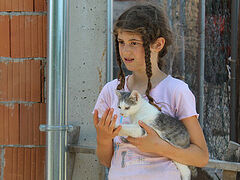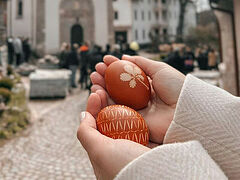 Members of charity organization “Kosovo Pomoravlje”
Members of charity organization “Kosovo Pomoravlje”
“Kosovo and Metohija has no medicines left!” “Banks in Kosovo have got no cash!” “Kosovo Serbs are facing a humanitarian crisis!” These are just some of the headlines in the media of the past few days that tell the public what life is like in the southern Serbian province. Jarinje, the administrative border crossing (a “state” border for some people) through which the medical supplies and cash are delivered to us in Kosovo, was closed from September, 23 to October, 18 because of the shooting at the Banjska monastery, next to the village of the same name in the north of the province.
But for us, the Serbs who reside in the south of the province, there is absolutely nothing new in this—we’ve been living with this for years without any hysteria in the mass media. It struck me for the umpteenth time: They only talk about real problems and, with a thoughtful air, discuss the “solutions to the existing problems” when something happens in the north. Or, when foreign and domestic journalists borrow the titles of articles from each other but ad-lib more concerns and pathetic elements. It turns out that you merely exist inside the “quote … unquote” long, empty words from the “international representatives” of all sorts who puff their cheeks arguing about the “easing of tensions,” or call to contain “both” sides (exactly “both,” meaning the Serbs too, right!), or talk about the “priority of relations of peace…”
Peace is priority for those who have it. As for us, the Serbs of Kosovo and Metohija, we are only allowed to continue dreaming about it.
For example, we have been dreaming for years that the pharmacies in our enclaves would be supplied with medicine and remedies, that we wouldn’t have to rush around the area or go abroad in search of medicines, gauze, bandages, and the most basic things for pregnant women and newborns, or a enter hospital with all the necessities. The south of Kosovo has permanent and extended delays in pension and salary payments (that is, of course, when you are lucky enough to actually have a job!). Any blockade or a ban is first test-run on the Serbs of Kosovo Pomoravlje and other southern parts of the province, but the enlightened public learns about these bans and blockades only when they affect the north, not before. “The Serbs from the south, they are our test subjects. They will stomach it. It’s not a big deal, it’s all good, as long as it doesn’t affect us.” But still, you know, it’s terrifying. It is scary when, say, an elderly person is left all alone, without any medicine or money, when there is no food in the house, when his life depends on someone who will happen to remember his existence and come to feed him.
It is terrifying when an elderly person is left without any medicine and money, when there is no food in the house
It is also terrifying, when, for example, your only income is the “social security” payouts that have been delayed for months, but you still have to feed your children, pay for electricity and water, to buy firewood for the winter that is almost here, except that your money didn’t reach you yet. It is terrifying and shameful when you send your student to study, but you can’t even help him pay for his lunch in the canteen or buy a travel pass....
“You are asking me how I’m doing.... I don’t know where to find money to buy firewood—that’s how I’m doing. Social security payments are late. And prices are extraordinary these days: we use all of our money to pay for food, school, and housing… It’s hard. Everyone is suffering,” said Dusan Peric.
His family is one of the youngest in our village of Partesh near Gnjilane, formerly a Serbian town. He is twenty-nine and the father of two children. Neither he or his wife have jobs, of course. They work in their field from dawn to dusk, but Dusan will gladly take any part-time work, although it all depends on the season. Sure, young as they are, they’ve got enough optimism and enthusiasm, and they don’t even think of losing heart. Like many others among us, they cradle the hope that the situation in Kosovo will improve (“miracles do happen”). They believe that this particular part of the sky above Kosovo is their cross and their life. There is no need to leave it; so, “yes, we will stay put. He whom God helps, nobody can harm. We will keep fighting. By the way, we receive great help in our struggles from our benefactors, including the readers of the Pravoslavie.Ru. Thanks to their help, the Peric family received enough firewood to weather the upcoming winter.”
It is “daring” audacity, some might think, to start families and build houses in Kosovo and Metohija. In the meantime, thank God, it is no longer such a rare thing for young Serbs. Certainly, the road from a wish to its realization isn’t simple; in all honesty, it’s quite arduous. But, despite major challenges, such as jobs, housing, and safety, there are many people who choose to walk it. What helps then? Or Who helps? On the one hand, the already mentioned young age and belief in good times to come, I think. On the other hand, we are convinced by our own example that you “don’t walk over the doorstep without asking His blessing”—and, when your doorstep is in Kosovo, you simply can’t do anything without God. So, the young people stay put in their native land and also come to live here.
Many among those who stayed have received their education locally during the tumultuous times. It happens—and quite often—that a large family denies itself many things in order to send one of its children to university, while the other children can’t even dream of studying somewhere far from home. The story of Dürer and his brother comes to mind, doesn’t it? It was about the artist’s brother who, according to legend, sacrificed everything for the young Albrecht to become a good artist. But this all seems to belong to past centuries, when education was the privilege of the wealthy; but how huge is the sacrifice of a poor family sending one of their children to receive education! That’s why any support for the young people to get an education these days serves as a great incentive for families to remain in Kosovo and Metohija. The students will thus live close to their families and there’d probably be no emigration or exodus from their native land. To help families with students, we launched a monthly scholarship program. One of our first scholarship recipients was Jovan Stojkovic from Gnjilane, the best young accordionist in Serbia—and our readers heard about him. He is currently studying at a music school and the preparatory school in Vranje, really close to Kosovo, where, to our mutual joy, he shows standout success. A young musician, he has become the pride of his home area. This is what his father said when we presented Jovan with the scholarship: “I cannot even describe in words how much he means to me. We made him live away from us to continue in his studies, but our boy is always with us in our hearts.” Just like his music.
 Jovan Stojkovic, the musician from Kosovo and Metohija
Jovan Stojkovic, the musician from Kosovo and Metohija
We often receive poignant and touching letters from parents.
“We have four children. Our eldest son is studying in a seminary in Belgrade, our daughter is studying Serbian language and literature in Mitrovica, our middle daughter is in high school in central Serbia, and our youngest son is in high school in Gorazdevac. I work for the Red Cross, my husband is a disabled war veteran. If you can, please help us. God will not forsake you.” This is how it sounds: so simple, honest, and maternal.
Such is the concern and the struggle of our people—so modest and unobtrusive, so quiet, but firm and resolute. The question arises: how else should we fight? Surely not by throwing a tantrum in the media or indeed complaining loudly. The power of God is made perfect in weakness—and we become convinced of this on the daily basis.
That’s why our work involves solving exactly these kinds of problems, challenges and troubles of everyday life that no one in “the truly civilized” world really knows about, and help people whose voices aren’t heard. It is so touching that so many good people help the Serbs of Kosovo and Metohija from their hearts. We are grateful to all who feel our suffering and understand the reasons why we are still here. With our life on the holy Serbian soil, we are not defending the current politics or a territory. We “simply” profess our faith in the Lord and defend the right of our people to exist. That is why we agree to have trials, such as living among aliens and foreigners, suffering humiliation, oblivion, ridicule, hatred and poverty. We also believe that we will be able to stand our ground, because we know that we must endure and suffer for the sake of our children, even if we never live to see the time when the media will report that we, the Serbs from Kosovo and Metohija, strange as it may seem, are still alive…




